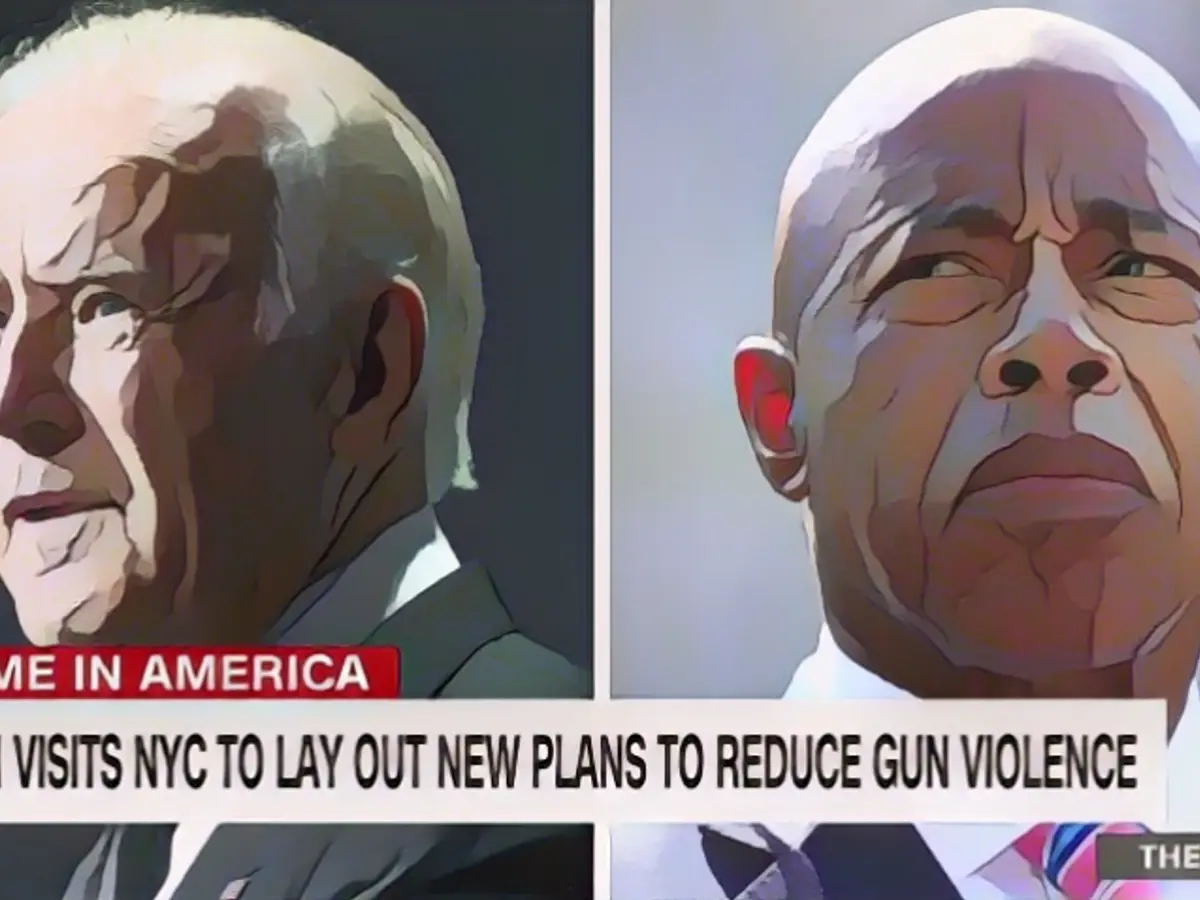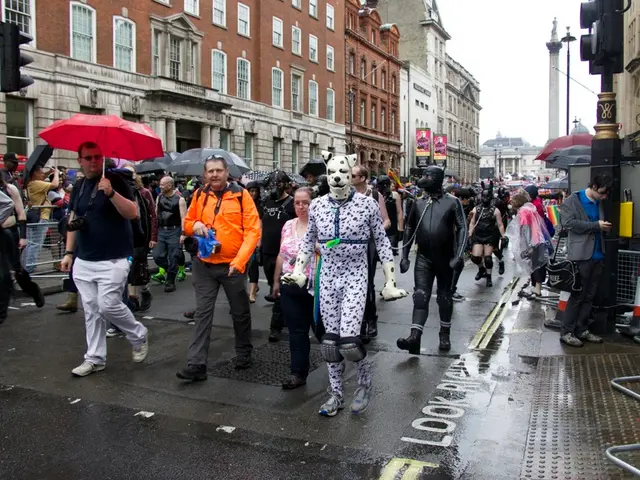Speaking on gun violence and the need to curb it, President Biden visited NYC on Thursday with Mayor Eric Adams, voicing concerns over escalating gun crime. Amid a series of high-profile crimes in the city, the Biden administration acknowledges the problem and takes steps to demonstrate a firm stance against crime. The visit also aimed to counter progressive critics demanding police funding cuts and Republican attacks against Democrats perceived as weak on crime.
Recent tragedy struck the NYPD with the murder of two officers, Jason Rivera and Wilbert Mora, who were shot while responding to a domestic violence call. Subsequently, Manhattan's new District Attorney, Alvin Bragg, came under political fire after releasing a memo advocating for alternatives to incarceration – a stance he later retracted and clarified.
Actress Susan Sarandon shared a critical tweet comparing the thousands of police officers at Rivera's funeral to fascists, implying they were not needed that day. However, the implication is debatable – were they not necessary on that specific day?
Controversial views such as Sarandon's, coupled with calls for criminal justice reform, reflect the complexities surrounding law enforcement. Supporting justice system reform does not mean condoning lawlessness, and Biden would err by attacking crime without addressing systemic racism in it.
The Black Lives Matter movement has critiqued racial bias in law enforcement and the criminal justice system, rooted in decades of sociological research. George Floyd's tragic death revealed the impact of deeply ingrained prejudices in policing, leading to significant changes in law enforcement practices.
Eric Adams, former police officer turned NYC Mayor, has consistently advocated for differentiated approaches to crime. While he supports controversial policing tactics, including stop-and-frisk, Adams often shares his personal experiences of police brutality and has long fought for community protection, particularly against discrimination against black and Hispanic New Yorkers.
While many moderately "tough on crime" Democrats back substantial criminal justice reforms, the core principles of the Black Lives Matter movement cannot be ignored. The imperative to reconsider some fundamental policing methods and prison sentencing guidelines – driven by racial biases – remains a top priority on Biden's agenda.
Despite the urgency to address crime and racial disparities, reforming police departments may be unpopular. Central to a President's power is using it to promote moral justice. As Robert Caro notes, President Lyndon Johnson, when advised to avoid controversial issues and focus on short-term gains, said, "What is a presidency for, after all?"
During Johnson's tenure, he proposed the Civil Rights Act of 1964, which banned racial segregation and employment discrimination in public facilities, despite knowing the risks. By responding to a groundswell of public sentiment, this was a massive political gamble Johnson knew might cost him the South, the Democratic heartland.
Today, nearly a decade after Trayvon Martin's murder, the country remains separated. Since the tragic events of 2012, Black Lives Matter has made significant strides in convincing the nation to confront institutional racism within the criminal justice system, a problem organisations like the NAACP have fought for generations to uncover.
While Johnson commissioned the Kerner Commission and released a report in 1968, admitting that white racism in law enforcement played a significant role in many 1967 urban riots, the nation did not act. Instead, it adopted the slogan "Law and Order" and elected Richard Nixon in 1968, who campaigned on that platform.
We can see a similar pattern emerging today. Moderate Democrats have accused progressives of alienating voters and aiding Republican electoral successes.
However, today is not the time to repeat the same mistakes. Racial bias in the criminal justice system represents a nationwide crisis, placing black Americans and other marginalized communities in danger simply for going about their daily lives. Moreover, much-needed resources elude youth in need of a fair trial, resulting in increased prison sentences for many.
Sign up for our free weekly newsletter
- Subscribe to CNN Opinion's weekly newsletter.
- Follow us on Twitter and Facebook In our polarized society, a President who aligns with popular but short-sighted views could ultimately do more harm than good. Instead, Biden has the opportunity to take a firm stance on vital issues that address crime and racial bias in the criminal justice system, simply because it's the right thing to do.

Read also:
To effectively address gun violence and reduce racial bias in the criminal justice system, President Biden should consider a multifaceted approach incorporating both policy initiatives and community engagement. Here are some strategies:
Tackling Gun Violence
- Establishing a Permanent Office for Gun Violence Prevention:
- This would provide sustained, coordinated federal response to the crisis, overseeing implementation of various prevention strategies such as data-driven initiatives and community-based programs.
- Implementing Comprehensive Legislation:
- The Bipartisan Safer Communities Act, signed in 2022, was a significant step. However, additional legislation may be necessary to close background check loopholes and address threats from 3D-printed guns.
- Community-Based Programs:
- Funding these programs, such as Baltimore's Group Violence Reduction Strategy, can reduce homicides and nonfatal shootings by engaging local mentors and community leaders.
- Empowering Survivors and Community Leaders:
- Elevating survivors' and community leaders' voices can lead to targeted solutions and save lives while fostering community ownership.
Reducing Racial Bias in the Criminal Justice System
- Addressing Historical Inequities:
- Implementing policies that recognise and rectify historical racial, sexist, and classist injustices within the criminal justice system is crucial.
- Focusing on Equity:
- Policies emphasizing racial equity, such as requiring racial impact statements, can help eliminate disparities.
- Collecting Disaggregated Data:
- Collecting racial and ethnic data on individuals involved in the criminal justice system can identify and address systemic biases, establishing fair policies.
- Community Involvement and Partnerships:
- Engaging with community partners for local justice reform projects can lead to more effective crime prevention, rehabilitation, and community reintegration strategies.
- Policy Reforms:
- Developing legislation that eliminates sentencing disparities, like those regarding crack cocaine, can help reduce racial bias in sentencing. Restoring Pell Grants for prisoners and implementing the Fair Chance Act can foster rehabilitation and reduce recidivism.
By integrating these strategies, President Biden can make significant strides in battling gun violence and reducing racial bias in the criminal justice system.
Enrichment Data:
President Biden can effectively address gun violence and reduce racial bias in the criminal justice system with a multifaceted approach involving policy initiatives, community engagement, and partnerships underscoring the priority issues. Here are some suggested strategies:
Addressing Gun Violence
- Establishing a Permanent Office for Gun Violence Prevention:
- Creation of a long-term, centralized governance structure for addressing gun violence provides strategic focus and resources to ensure consistent progress.
- Implementing Comprehensive Legislation:
- Continued or new legislation addressing gun safety, background checks, and regulatory oversight can further strengthen measures and reduce gun violence.
- Community-Based Programs:
- Funding community-focused initiatives, birthplace of effective violence reduction practices, can encourage self-policing and altogether foster safer neighborhoods.
- Empowering Survivors and Community Leaders:
- Including survivors and community leaders in discussions and decision-making processes promotes empathy, understanding, and the installation of equitable policies.
- Collaborative Policing Practices:
- Building collaborative relationships between police and communities fosters trust, leads to the identification of local needs, and enhances crime prevention, victim assistance, and rehabilitation efforts.
Reducing Racial Bias in the Criminal Justice System
- Addressing Historical Inequities:
- Acknowledging and addressing systemic racial biases in the criminal justice system down to its fundamental roots and assuring a more equitable judicial process requires initial reflection.
- Implementing Racial Equity Policies:
- Enacting policies with racial equity considerations ensures a balanced approach to tackling disparities, encouraging fairness and equality in penal practices.
- Data-Driven Approaches:
- Demanding rigorous data collection and analysis facilitates the detection of hidden racial biases and identifies opportunities for improvement in the judicial process.
- Community Involvement and Collaboration:
- Embracing community participation in policy development and implementation helps reflect the needs and desires of local communities, ultimately bolstering their trust in the criminal justice system.
- Policy Reforms:
- Advocating for legislation addressing sentencing disparities, eliminating racial discrimination in mandatory minimums, and diversifying the judicial system obliges the nation to address and rectify historical racial injustices.
By adhering to these strategies, President Biden can bolster his commitment to supporting a more grounded, equitable stance regarding gun violence and racial bias in the criminal justice system.







